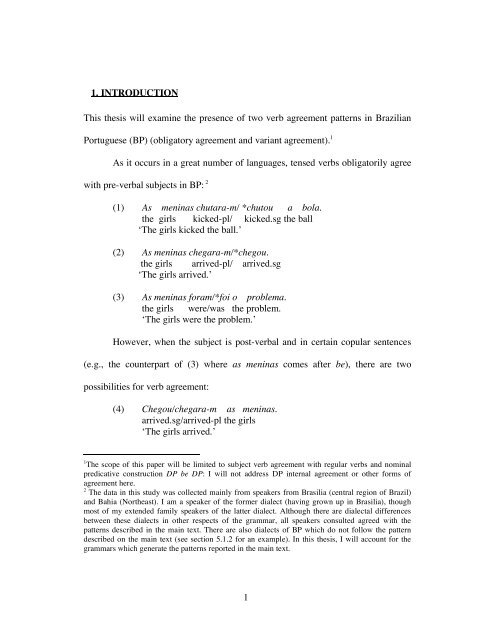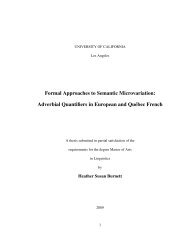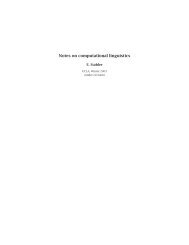Post Verbal Subjects and Agreement in Brazilian Portuguese
Post Verbal Subjects and Agreement in Brazilian Portuguese
Post Verbal Subjects and Agreement in Brazilian Portuguese
Create successful ePaper yourself
Turn your PDF publications into a flip-book with our unique Google optimized e-Paper software.
1. INTRODUCTION<br />
This thesis will exam<strong>in</strong>e the presence of two verb agreement patterns <strong>in</strong> <strong>Brazilian</strong><br />
<strong>Portuguese</strong> (BP) (obligatory agreement <strong>and</strong> variant agreement). 1<br />
As it occurs <strong>in</strong> a great number of languages, tensed verbs obligatorily agree<br />
with pre-verbal subjects <strong>in</strong> BP: 2<br />
(1) As men<strong>in</strong>as chutara-m/ *chutou a bola.<br />
the girls kicked-pl/ kicked.sg the ball<br />
‘The girls kicked the ball.’<br />
(2) As men<strong>in</strong>as chegara-m/*chegou.<br />
the girls arrived-pl/ arrived.sg<br />
‘The girls arrived.’<br />
(3) As men<strong>in</strong>as foram/*foi o problema.<br />
the girls were/was the problem.<br />
‘The girls were the problem.’<br />
However, when the subject is post-verbal <strong>and</strong> <strong>in</strong> certa<strong>in</strong> copular sentences<br />
(e.g., the counterpart of (3) where as men<strong>in</strong>as comes after be), there are two<br />
possibilities for verb agreement:<br />
(4) Chegou/chegara-m as men<strong>in</strong>as.<br />
arrived.sg/arrived-pl the girls<br />
‘The girls arrived.’<br />
1 The scope of this paper will be limited to subject verb agreement with regular verbs <strong>and</strong> nom<strong>in</strong>al<br />
predicative construction DP be DP: I will not address DP <strong>in</strong>ternal agreement or other forms of<br />
agreement here.<br />
2 The data <strong>in</strong> this study was collected ma<strong>in</strong>ly from speakers from Brasilia (central region of Brazil)<br />
<strong>and</strong> Bahia (Northeast). I am a speaker of the former dialect (hav<strong>in</strong>g grown up <strong>in</strong> Brasilia), though<br />
most of my extended family speakers of the latter dialect. Although there are dialectal differences<br />
between these dialects <strong>in</strong> other respects of the grammar, all speakers consulted agreed with the<br />
patterns described <strong>in</strong> the ma<strong>in</strong> text. There are also dialects of BP which do not follow the pattern<br />
described on the ma<strong>in</strong> text (see section 5.1.2 for an example). In this thesis, I will account for the<br />
grammars which generate the patterns reported <strong>in</strong> the ma<strong>in</strong> text.<br />
1

















